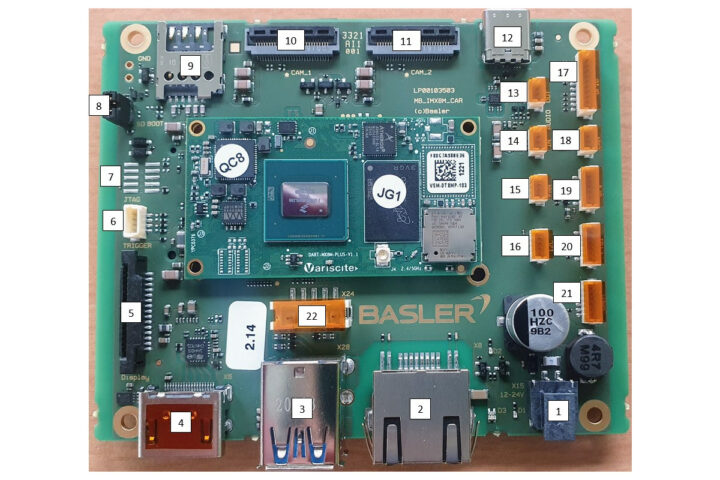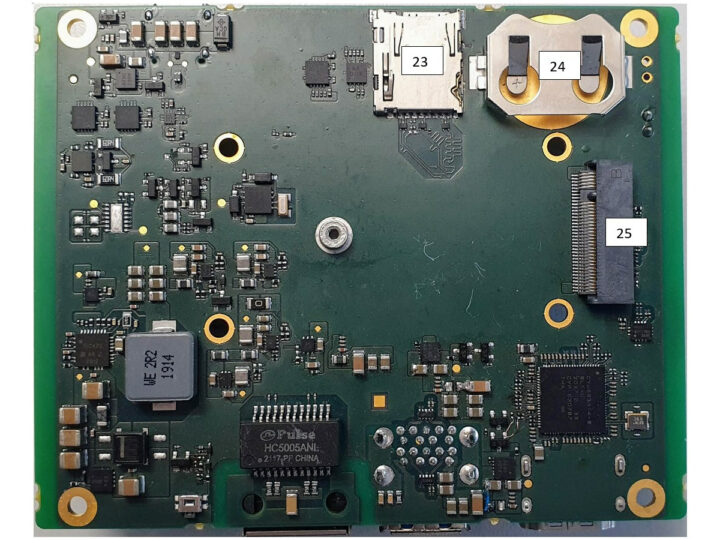Basler prB-IMX8MP is a Linux-based, NXP i.MX 8M Plus powered embedded vision processing kit working with the company’s cameras designed for factory automation, medicine, traffic and several other markets.
The board is equipped with Variscite DART-MX8M-Plus system-on-module and offers multiple camera interfaces to support BCON for MIPI, GigE Vision, and USB3 Vision cameras through Basler’s pylon Camera Software Suite.
Basler prB-IMX8MP specifications with interfaces in bold usable by Basler cameras:
- SoC – NXP i.MX 8M Plus quad-core Cortex-A53 processor clocked at up to 1.8GHz, Cortex-M7 real-time core @ 800 MHz, 1080p H265/H264 encode/decode, AI/ML accelerator up to 2.3 TOPS, Vivante GC7000UL 3D GPU, Vivante GC520L 2D GPU
- System Memory – 8GB (CNXSoft: Probably a mistake since the DART-MX8M-PLUS module only supports 1GB to 4GB RAM. Is it 8 Gbit = 1GB?)
- Storage – 64 GB flash, MicroSD card slot
- Video Output – HDMI 2.0a up to 1080p60, 2-lane MIPI DSI port (5), LVDS
- Audio – Line-In / Mic-In via connectors (13,14)
- Camera I/F
- 2x MIPI CSI-2 via 2x BCON for MIPI connectors (10, 11)
-
Trigger (6) port to trigger the cameras
- Networking
- Gigabit Ethernet port
- WiFi and Bluetooth
- USB – 2x USB 3.0, USB 2.0
- Expansion
- GPIOs, I2C, SPI
- UART, CAN
- M.2 Key-B socket tested with M.2 2242 SSD with PCIe connection, M.2 2242/3042 network cards for HSDPA/4G LTE/5G
- Debugging – JTAG, USB-C port
- Power Supply
- Input – 12-24 VDC
- Consumption – 7 W (typical)
- Dimensions – 100 x 80 x 30 mm
- Weight – 140 grams including 2x BCON for MIPI cameras and heatsink
- Conformity – USB3 Vision, GigE Vision, CE, GenICam
Basler provides a Linux Yocto BSP, as well as Basler’s Python-based pylon API and required Basler camera drivers. The company included cameras says the following BCON for MIPI camera modules are supported: daA2500-60mc, daA3840-30mc, daA2500-60mci, and daA4200-30mci. More technical details can be found in the documentation.
There are a few terms that I’m not quite familiar with so let’s look into those:
- The BCON for MIPI Interface complies with the MIPI CSI-2 specification and connects to the host via a 28-pin flat flex cable (FFC) connector. It’s a connector and form factor defined by Basler
- USB3 Vision is an interface standard managed by the Association for Advancing Automation. It is designed for high bandwidth USB 3.0 industrial cameras and uses the GenICam programming interface.
- Defined by EMVA (European Machine Vision Association), GenICam is a generic programming interface for all kinds of devices including cameras, no matter what interface technology (GigE Vision, USB3 Vision, CoaXPress, Camera Link HS, Camera Link etc.) they are using. This allows keeping the same application programming interface (API) for USB or MIPI CSI cameras for instance.
- Managed by Association for Advancing Automation, GigE Vision is a global camera interface standard using Gigabit Ethernet and allowing fast image transfer using low-cost standard cables over very long lengths. The GigE Vision standard aims to improve interoperability between compliant hardware and software from different vendors.
Basler prB-IMX8MP embedded vision processing kit has been in mass production since Q4 2021, but pricing has not been made public. You can request a quote and/or find additional information on the product page.

Jean-Luc started CNX Software in 2010 as a part-time endeavor, before quitting his job as a software engineering manager, and starting to write daily news, and reviews full time later in 2011.
Support CNX Software! Donate via cryptocurrencies, become a Patron on Patreon, or purchase goods on Amazon or Aliexpress






